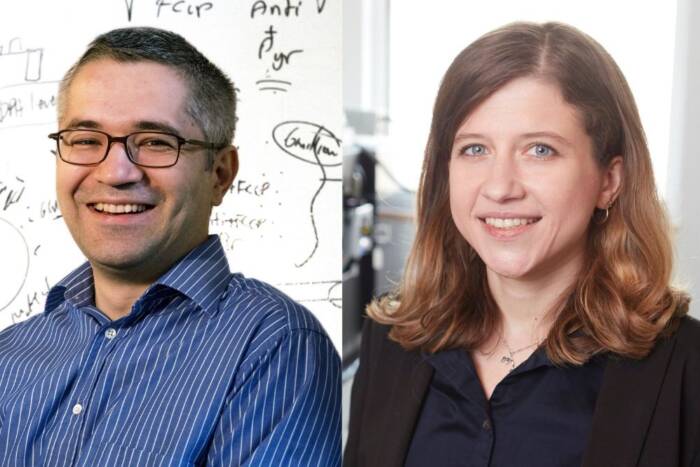The Rockefeller University joins with leading New York City-area institutions to launch new Chan Zuckerberg research hub
Today, the Chan Zuckerberg Initiative (CZI) announced the launch of a new biomedical research hub in New York City that will catalyze collaboration between leading scientific and technology institutions in the area, with the goal of solving grand scientific challenges on a 10- to 15-year time horizons. The Chan Zuckerberg Biohub New York (CZ Biohub NY) brings together Columbia University, The Rockefeller University, and Yale University to create new technologies to characterize and bioengineer immune cells—with the ultimate goal of creating disease-specific “cellular endoscopes” that can detect early stages of disease in cells, monitor cell changes, and resolve diseases before they become untreatable. New York State and New York City are each committed to contributing $10 million to the CZ Biohub NY, which will be led by Professor Andrea Califano of Columbia University.
The CZ Biohub New York is the fourth research institute in the Chan Zuckerberg Biohub Network, a groundbreaking collaborative model for scientific research. The Network includes the first CZ Biohub, in San Francisco, a second in Chicago, and the Chan Zuckerberg Institute for Advanced Biological Imaging in Redwood City, California. Together, the CZ Biohub Network institutions will pursue science and technologies that quantify human biology in action to help researchers measure how cells and tissues function to increase our understanding of health and disease.
“The approach that CZ Biohub New York will take is groundbreaking and exciting,” says Sohail Tavazoie, Leon Hess Professor at Rockefeller and part of the CZ Biohub NY leadership. “Engineering immune cells to detect signals of disease earlier than we’re able to now, before symptoms are obvious and the illness has advanced, would expand treatment options for a variety of conditions. We could see improvements in the outcomes of diseases like ovarian and pancreatic cancer as well as neurodegenerative diseases like Parkinson’s or Alzheimer’s.”
Lab tests and imaging scans can help doctors make some early diagnoses, but developing tools that can detect abnormalities before diseases take hold presents an opportunity that offers the potential to dramatically improve medical care. Immune cells are ideally suited to meet this challenge, as they are the only cells in our body that come in contact with virtually all of our tissues, by constantly roaming throughout the body in the blood and lymphatic system, thus helping monitor and maintain the health of our organs. CZ Biohub NY will unlock the vast information stored in the “molecular memory” of immune cells using single-cell biology tools, cutting-edge experimental technologies, machine learning, and artificial intelligence (AI), and then bioengineer new functions into immune cells to continuously monitor and manage organ and tissue health.
Over the past decade, cancer immunotherapies—treatments in which immune cells are engineered to specifically attack tumors—have seen great success, and have become mainstream therapies for certain forms of cancer. But there has been considerably less scientific attention on the medical potential of the sensing and “molecular recording” capabilities inherent to immune cells that come in contact with diseased cells. CZ Biohub NY aims to refine and amplify this ability to detect and decode subtle signs of early-stage disease that can elude conventional testing, as well as to deliver treatment directly upon detection.
The CZ Biohub will first focus on learning more about the molecular memory and states of immune cells when they sense signals secreted by diseased cells and organs. This will help predict early signs of disease that are tissue-specific. Building on this, researchers will work to understand the mechanisms of immune cell trafficking to further direct cells to desired organs on-demand and to sense novel disease signals they are not yet built to detect. This will help CZ Biohub NY to bioengineer immune cells that can travel to specific organs, sense any potential abnormalities, and then record information in their molecular state for easy detection from a simple blood draw or by using non-invasive engineered devices, for further interpretation by scientists and eventually physicians.
CZ Biohub NY will initially apply these novel, technology-driven approaches to hard-to-detect cancers such as ovarian and pancreatic cancers; neurodegenerative diseases, including Parkinson’s and Alzheimer’s; as well as aging and autoimmunity. The next step is further training immune cells to make targeted repairs, such as promoting inflammation at a tumor site to activate a robust immune response.
“Bringing a new CZ Biohub to NYC to take on this audacious project underscores the vibrant biomedical community in the NY metro area,” says Rockefeller President Richard P. Lifton, who helped assemble the CZ Biohub NY team. “Rockefeller is thrilled to be a partner in this visionary project. We and our partner institutions are very proud to be part of the growing CZ Biohub Network.”


